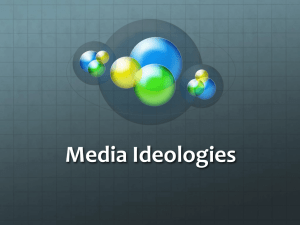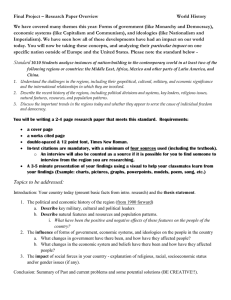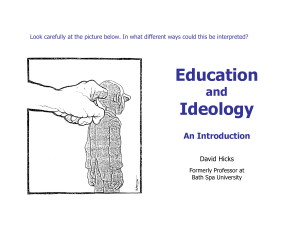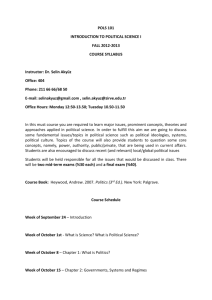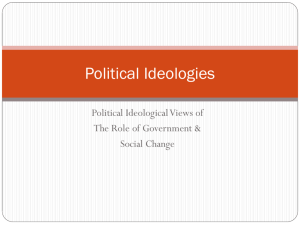Although discovering the hallmark categories of ideology so that compar-
advertisement
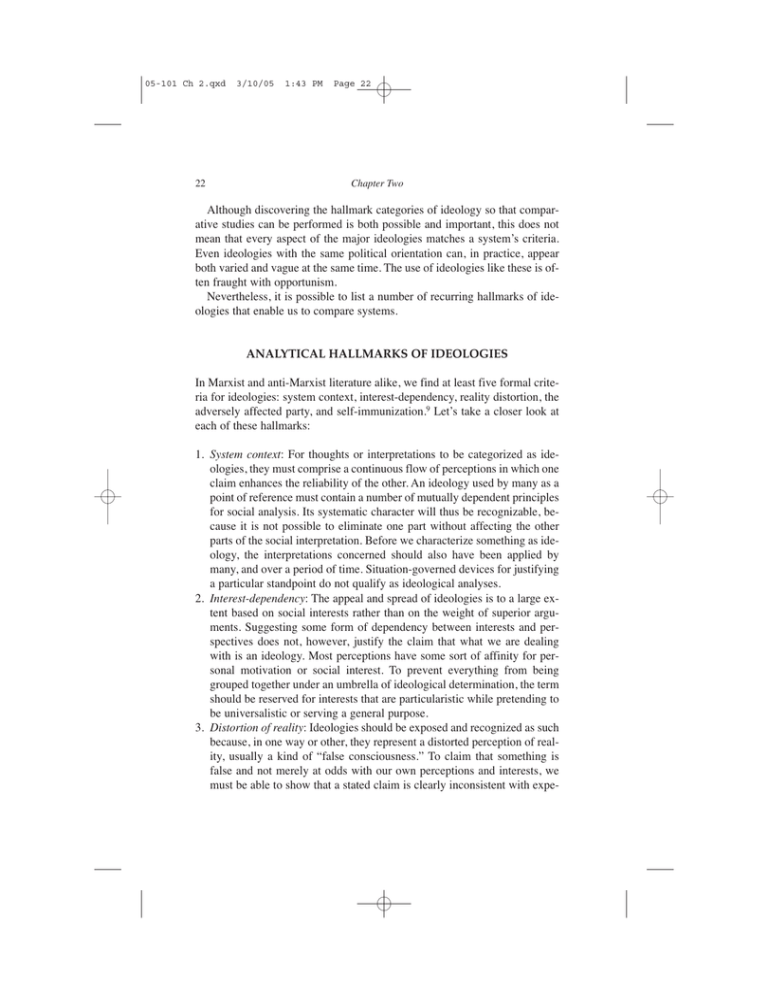
05-101 Ch 2.qxd 22 3/10/05 1:43 PM Page 22 Chapter Two Although discovering the hallmark categories of ideology so that comparative studies can be performed is both possible and important, this does not mean that every aspect of the major ideologies matches a system’s criteria. Even ideologies with the same political orientation can, in practice, appear both varied and vague at the same time. The use of ideologies like these is often fraught with opportunism. Nevertheless, it is possible to list a number of recurring hallmarks of ideologies that enable us to compare systems. ANALYTICAL HALLMARKS OF IDEOLOGIES In Marxist and anti-Marxist literature alike, we find at least five formal criteria for ideologies: system context, interest-dependency, reality distortion, the adversely affected party, and self-immunization.9 Let’s take a closer look at each of these hallmarks: 1. System context: For thoughts or interpretations to be categorized as ideologies, they must comprise a continuous flow of perceptions in which one claim enhances the reliability of the other. An ideology used by many as a point of reference must contain a number of mutually dependent principles for social analysis. Its systematic character will thus be recognizable, because it is not possible to eliminate one part without affecting the other parts of the social interpretation. Before we characterize something as ideology, the interpretations concerned should also have been applied by many, and over a period of time. Situation-governed devices for justifying a particular standpoint do not qualify as ideological analyses. 2. Interest-dependency: The appeal and spread of ideologies is to a large extent based on social interests rather than on the weight of superior arguments. Suggesting some form of dependency between interests and perspectives does not, however, justify the claim that what we are dealing with is an ideology. Most perceptions have some sort of affinity for personal motivation or social interest. To prevent everything from being grouped together under an umbrella of ideological determination, the term should be reserved for interests that are particularistic while pretending to be universalistic or serving a general purpose. 3. Distortion of reality: Ideologies should be exposed and recognized as such because, in one way or other, they represent a distorted perception of reality, usually a kind of “false consciousness.” To claim that something is false and not merely at odds with our own perceptions and interests, we must be able to show that a stated claim is clearly inconsistent with expe- 05-101 Ch 2.qxd 3/10/05 1:43 PM Page 23 Cultural Systems and Functionality 23 rience or with a logical way of thinking, or that the interpretations in question are clearly less functional than plausible alternative interpretations. Demonstrating that we are up against arguments with non-falsifiable metaphysical and axiomatic principles does not, in itself, qualify as ideological determination. No interpretations lack presuppositions. Nor should all types of human assessment error and maladjustments be traced back to ideologies. False assessments that originate from the personality traits of a given player, or from coincidental situation-governed circumstances, lie beyond the scope of the present discussion. 4. The adversely affected party: In the literature on ideologies, the notion that some people will be suppressed or adversely affected if a reigning ideology remains predominant is a recurring theme. There are often several reasons why reality-distorted notions, defended by people with vested interests, will ultimately cause people to lose touch with reality and also lead to an increasing number of maladjustments, which are bound to affect something or somebody. This “something or somebody” need not consist of social categories such as class or gender. The fact that the ideologyexposing literature still suffers from a lopsided emphasis on major—and potentially strong—groups as those most adversely affected is undoubtedly due to a hope that these very groups will be motivated enough to break free from the dominant ideology. This is understood clearest when a person develops a rebellious and vengeful streak as they learn to view themselves as one of “the suppressed.” Nevertheless, we must take into consideration how an adversely affected party in a reality-distorted ideology might in fact be Mother Nature herself, future generations, a specific civilization or society on a grand scale, for that matter. 5. Self-immunization: Since, analytically speaking, ideologies enjoy an intellectual status other than the one they invoke, it is only reasonable to expect that people who have benefited from a specific ideology will do their utmost to ward off close scrutiny and criticism. Individual defenders of an ideology are not the only ones with such needs. We can expect to find immanent interpretations built into the ideological system for the purpose of defending social groups against intimidating arguments. Systems of self-immunization, closely related to the general system of political interpretation, often have easily recognizable structures. Arguments threatening the credibility of an ideology are not always met with superior intellectual arguments. Such arguments are more often generally interpreted as expressions of particular interest on the part of hostile persons, groups, classes or nations. More to the point, an ideology may present itself as indisputable, as representing reason, science, history, modernity or progress. 05-101 Ch 2.qxd 24 3/10/05 1:43 PM Page 24 Chapter Two This list could undoubtedly have been extended, but then the categorization would have excluded a number of social interpretations that should be included in comparisons to enhance our insight into ideologies. The goal here was not to maximize precision, but rather to highlight certain key contexts. These five hallmarks should be sufficient for recognizing ideologies, even in the face of social interpretations that are not presented as ideological. This list should also help us focus on the search for ideologies’ system characteristics. It applies, first and foremost, to a way of thinking, the system characteristics of a society or the relationship between society and the individual. An ideology that offers a simplistic and appealing interpretation of this relationship can be expected to support mutually supportive interpretations. Not only will an ideology accentuate key elements, but, based on earlier comments on self-immunization, we can safely assume that an ideology will also reject interpretations dependent on ideologically inconsistent premises. And in view of the social sciences’ quest for perspectives, we might expect to discover considerable disparity here between ideological and research-oriented attitudes. In addition to the systems of thought, we could probably detect system characteristics in the social utilization of ideologies as well. The interaction between specific interests and the choice of ideological interpretation is hardly coincidental. An ideology depends on credibility. All ideologies represent interpretations that put competing ideologies in a bad light. Nevertheless, the most substantive references for credibility are on a different level than mutual competition among ideologies. We need to distinguish between ideologies, myths and beliefs. THE DEPENDENCE OF IDEOLOGIES ON MYTH A recurring theme of ideologies is that they are designed to unite and stimulate collective action. Their credibility is often closely tied to the traits of specific leaders or parties, which are perceived as representing specific groups or life forms that are distinctive from other leaders, groups and life forms. An ideology is often skewed toward an antagonistic relationship to conflicting ideologies. This implies that an ideology’s credibility depends on an overarching justification of its attempt to express what is rational, good or just. Social myths enter the picture at this point, and not only those with a clear political imprint. Nowadays, myths, from the Greek word mythos, are spread and interpreted in variety of ways.10 By no means can it be taken for granted that the most important myths in contemporary society are labeled and recognized as myths. As a rule, myths are perceived as concrete, often personified, accounts that provide us with dramatic pictures and explanations of the
